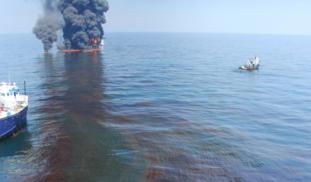Please wait...
About This Project
Natural materials may provide an effective, economical, and safer alternative to the chemicals commonly used for oil spill recovery today. The use of naturally occurring, soap-like materials in oil spill response could prove less harmful to worker health and reduce the impact of the cleanup chemicals on the environment.

Browse Other Projects on Experiment
Related Projects
Real-time underwater fish identification and biomonitoring via machine learning-based compression of video to text
Underwater monitoring of marine life has traditionally followed a "set it and retrieve it” approach due...
Combining eDNA & Biologging Technologies to Capture Deep-Sea Predatory Interactions Between Whales & Prey
We aim to combine eDNA sampling and biologging to study predator-prey interactions in the deep sea in real...
Can A Low-Cost Camera & Loitering Guard Better Monitor Marine Protected Areas?
Marine Protected Areas (MPAs) are difficult to enforce due to their remoteness and often invisible borders...




